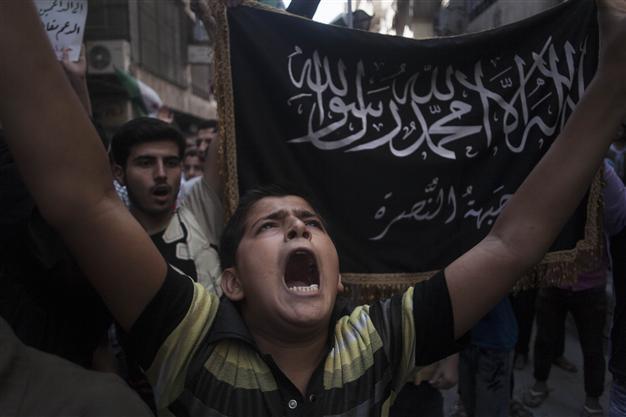Al-Qaeda admits Syria war role, as US steps up talks
BAGHDAD - Agence France-Presse

n this Friday, Sept. 21, 2012 file photo, a Syrian boy shouts slogans against the regime in front of a flag of the armed Islamic opposition group, the Nusra front. AP Photo
Al-Qaeda in Iraq admitted on Tuesday long-held suspicions it is behind jihadists fighting Syria's regime, as the United States stepped up its efforts to end the country's civil war.UN chief Ban Ki-Moon, meanwhile, called on Syria to approve a United Nations mission of inspectors to probe the alleged use of chemical weapons in the spiralling two-year conflict.
"The Al-Nusra Front is simply a branch of the Islamic State of Iraq," ISI's chief Abu Bakr al-Baghdadi said in recording posted online, adding the jihadist group was fighting for an Islamic state in Syria.
The groups would be combined and called the Islamic State in Iraq and the Levant, Baghdadi said, describing Al-Nusra front leader Abu Mohammed al-Jawlani as "one of our soldiers".
"We chose al-Jawlani... as well as other fighters to go from Iraq to Syria... We prepared plans and work policies. We gave them money and personnel support," said Baghdadi.
His declaration came a day after an Al-Nusra-style suicide car bomb attack in the heart of the Syrian capital Damascus killed at least 15 people and wounded 146 others.
It also came after Al-Qaeda's global chief, Ayman al-Zawahiri, urged rebels to fight to establish an Islamic state in Syria, in an audio message posted on the Internet on Sunday.
Al-Nusra Front, which announced its creation in a January 2012 video, is a magnet for foreign fighters seeking to take part in the insurgency against the regime of Syrian President Bashar al-Assad.
The West has been wary, and in December the United States announced it was labelling Al-Nusra Front a "terrorist" organisation because of suspected ties to ISI.
The New York Times reported last month the CIA was helping Arab states and Turkey to boost arms shipments to Syria's rebels, in a move to ensure the weapons do not end up in the hands of extremists.
Asked on Tuesday if the United States was stepping up its military options in Syria, US Secretary of State John Kerry said such moves would be "part of our discussions this week in Washington".
Kerry also said he would meet with the Syrian opposition in London, in remarks to journalists shortly before he departed Israel for the British capital.
"We will be discussing various means about having an impact on President Assad's calculations about where the battlefield is going," said the top US diplomat.
"We are left with no choice but to try find ways to get him to think differently about what lies in the future." In March, France and Britain argued that scrapping an EU arms embargo for Syria would tilt the balance on the ground and help prompt a political settlement of the conflict.
On March 14, Foreign Minister Laurent Fabius said France was seeking to lift the embargo to help rebels defend themselves from loyalist forces who were receiving arms from Iran and Russia.
But France has since backtracked, saying it was still undecided.
Iraq, which is under intense US pressure to step up inspections of Iranian aircraft suspected of flying weapons to Syria, checked a second Iranian plane bound for the country in as many days on Tuesday.
It only found humanitarian materiel, but drew a swift response from Tehran, which protested to Baghdad and branded the allegations as "unfounded".
No group claimed responsibility for Monday's bombing in Damascus, but the opposition National Coalition condemned the attack while suggesting the regime bore responsibility.
"The Syrian Coalition, on behalf of the Syrian people, condemns without any hesitation, all bombings and hostilities against civilians, and considers these acts crimes against humanity," said a statement.
Syria's conflict erupted in March 2011 with peaceful protests against Assad's regime but has evolved into a civil war the UN says has killed at least 70,000 people.
Meanwhile, the United Nations said that aid operations for Syrian refugees have reached breaking point in the face of a massive funding shortfall, amid fears the number of people fleeing the conflict could triple.
















